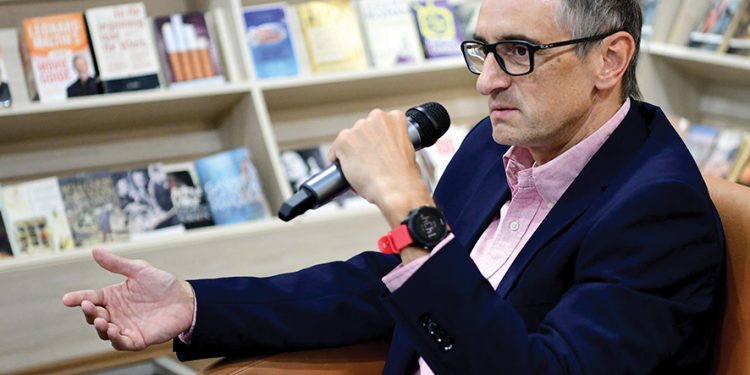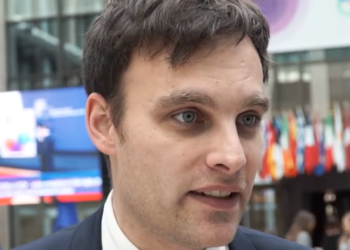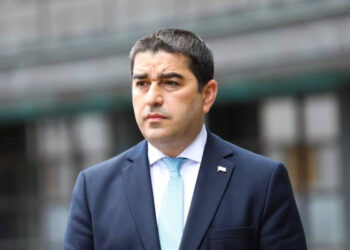Sergei Medvedev is a Russian scholar and professor at the Charles University in Prague, who has worked at the Marshall Center for Security Studies in Germany, the Finnish Institute of International Affairs in Helsinki, the Instituto Affari Internazionali in Rome, and the Institute of Europe of Russian Academy of Sciences in Moscow. Medvedev won the 2020 Pushkin House Russian Book Prize for his book The Return of the Russian Leviathan. Radio Free Europe/Radio Liberty’s Georgian service sat down with him to find out his take on the latest happenings in the Nagorno-Karabakh region, and how this will affect Russia’s dominance over the South Caucasus.
“The security paradigm won’t change dramatically,” he tells us. “What’s happened is not really a surprise. It’s really short war, a one-day war. It’s clear that Armenia, being the loser in the earlier Karabakh War, was destined to endure another defeat at some point. Azerbaijan wants to solve the Karabakh question, and it looks like it’s well on its way to doing so. It’s also a longer term trend of Russia losing its influence and yielding its influence to more powerful players like Turkey and China. The funny thing is that Russia not only has Uncle Xi, the Big Brother of China, but also Recep of Turkey, too, becoming a big brother for Russia now. It shows how weak Russia has become, a direct consequence of the war in Ukraine and Russia’s poor performance, and the fact that Russia is absolutely overstretched.”
How weak are we talking? What influence does Russia still have on this region?
There is a residual influence. You see, Russia is still quite strong, and it enjoyed centuries of uncurtailed dominance in the region. And we see in Georgian politics lots of Russian influence. I think Russia will continue putting pressure on Georgia, both militarily, through South Ossetia and Abkhazia, and also via hybrid influence from Russian agents, economic partnerships, corruption, and so on. So, it’s still a very dangerous and powerful player. And Georgia will obviously be one of the objectives. The seed was planted decades ago – the Russia’s agents, Russian businesses; it’s a whole empire, it doesn’t just crumble overnight.
How fateful has Pashinyan’s presence been in Armenia, with the Kremlin intent on making him a scapegoat for all of this?
He’s in a sense a scapegoat, yes: He had to make this absolutely unavoidable choice right now. The Armenians have a strong sense of national resentment and anger and grief, and they are going to push the blame on him, and the Kremlin will be using this quite smartly, because Putin personally hates Pashinyan. He’s a popular leader, one who was selected and put in power by the Revolution on the street, and that’s Putin’s biggest fear- street revolutions. Putin will be happy to see Pashinyan go. And then we’ll see powerful Moscow Armenians, clients, conspiring against Pashinyan, trying to work their way back into Armenian politics.
This will be a first precedent in the region when territorial integrity is regained, and through military means to boot. What would that mean for other conflicts in the region, Georgia in particular?
It’s a perennial game of world diplomacy and world politics: The right of self-determination versus the right of territorial integrity. It never plays out completely; it all depends on the situation of the day. Armenia failed completely in this national reunification project, while Azerbaijan has played quite smartly in the past 20 years, building some kind of developmental authoritarianism, using its oil money well, picking a time when Russia was focused on Ukraine. And, of course, it has a strong backup in Turkey. The Armenian backup was Russia, but one can only regret having a backup in Russia, which is known for betraying its allies.
Over to Ukraine. Who is winning in the long war that Putin seems to have resigned himself to?
I still think that in the balance of the situation today, Ukraine has the advantage, but it’s a very precarious balance. If we’re talking one year from now, I don’t know where it will go. The US election will be at stake. And what happens with the Ukrainian population? The problems with grain and destroyed infrastructure? This is all a very, very thin balance.
It’s rather a quantum situation. We don’t have straightforward parameters- the parameters are changing every day. We cannot discard the Ukrainian resilience and success and the fact that new weapons are coming in, and that Russian resources are thinning out. I hope that Ukraine will prevail and will kick the Russians off its territory in a year or so. I’m not a mathematician, I’m not calculating in my head. Let’s say there’s reasonable hope that this could happen, but, on the other hand, it is also a reasonable risk. If it protracts for another year or two years, then too many powerful factors could work against it. The fatigue of the West, of the elites, of the Ukrainian population, the elections, lack of military success and so on. Again, it’s a very thin balance, and it can go anywhere.
The consensus among the historians I’ve spoken to is that this war is a history-defining moment. Can you, as a historian, steal us a glimpse into the various futures, depending on how this war ends?
Sure. One variant is Ukraine prevailing and consolidating its statehood, and becoming a sort of Israel of sorts – highly militarized, but also a very forward-looking nation. For Russia, it’s very difficult to see a positive scenario – positive for the world and for the Russian people and for the future, because Russia winning may be positive for the Russian generals in the short term, but in the long run, I think the country is doomed. The question is saving the country from complete failure and collapse.
Is it still doomed if Ukraine wins?
No. If Ukraine wins, and Russia accepts the defeat, this will lead to eventual transformation and reform in Russia, and different elites coming to power. It’ll be like Russia accepting losing the war in Afghanistan. We saw how change happened quite soon after. Russia also lost the Japanese war, on the eve of the revolution. So Russia has an experience of losing wars. And this can lead to positive political outcomes.
So the regime would be doomed, not the country.
Yes, the regime could collapse and the country could embark on a process of difficult transformation. But I think the most likely scenario, what I see for Russia, irrespective of the war in Ukraine, is a protracted, ongoing multilayer decay, probably a better situation in the big cities, but the country itself will not find enough reserve to transform itself again. So I see a long Iran scenario, a long Venezuela scenario. Unfortunately, for me, this is the most likely scenario.
That also presumes the West won’t be tempted toward another Russia Reset.
No, no. I think the West will give up on Russia, and there will be a self-inflicted semi-isolation, like limited engagement with the West. Russia will be left to its own devices, to stew in its own juices – so a combination of Iran and Venezuela until whatever the next historical opportunity will be, the big technological revolution, whatever change comes to the world. But in the medium run, I see this, unfortunately, as the more likely scenario, a protracted decay, irrespective of winning or losing the war in Ukraine.
Even if there is some sort of stalemate or frozen conflict?
Yes. This could also be the Korea scenario, a stalemate, and Ukraine could be partially integrated into the West and still get assistance.
Which would enable Russia to survive in its current form?
Russia can’t survive in its current form. Russia has given up on development; it’s preoccupied with surviving. And it can survive for another 20-30 years, there is still enough demand for oil in the world. But there’s a big oil revolution going on, with claims the world will give up oil by 2050. So, especially now, with this war, it’s pushed things forward and seen people giving up the green agendas. So I predict Russia still has a quarter century just to stew in this condition.
Interview by Vazha Tavberidze














